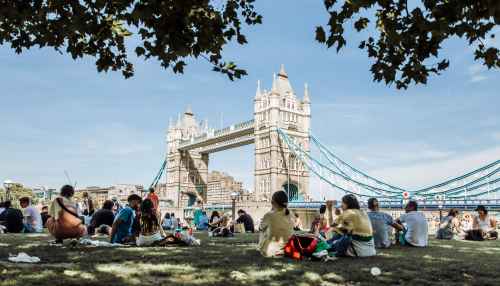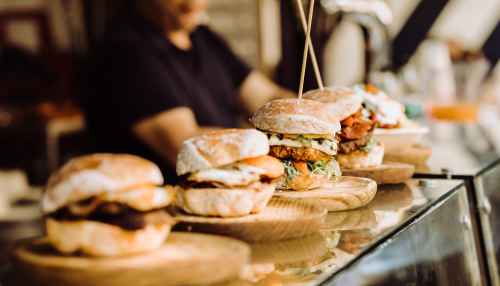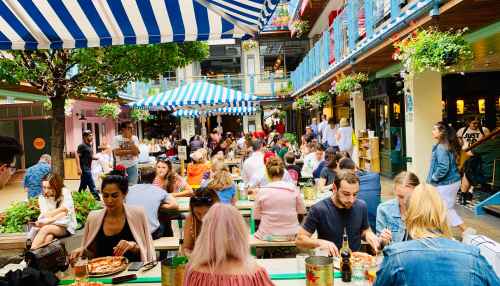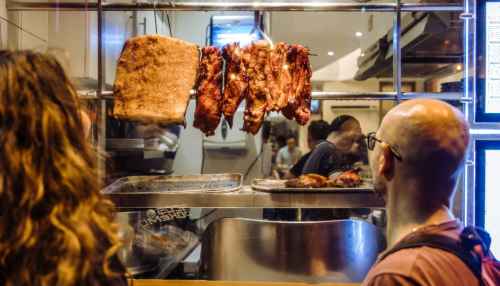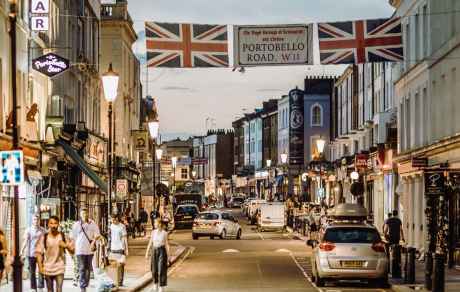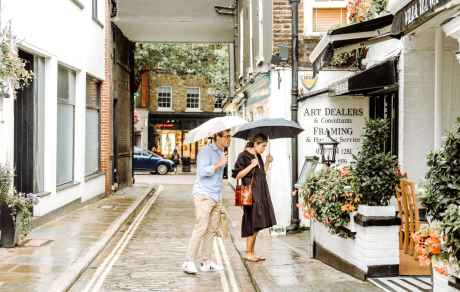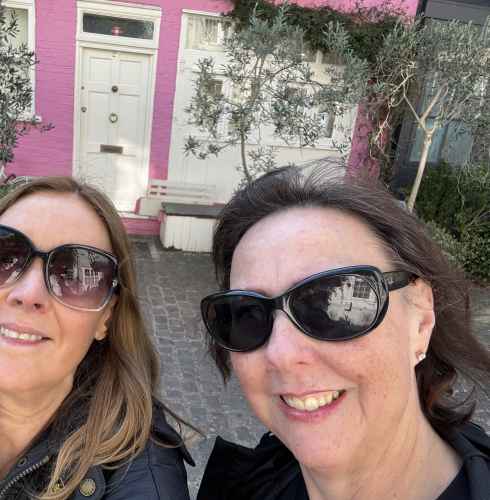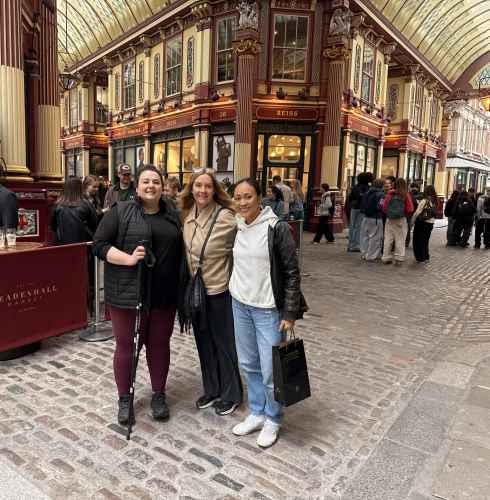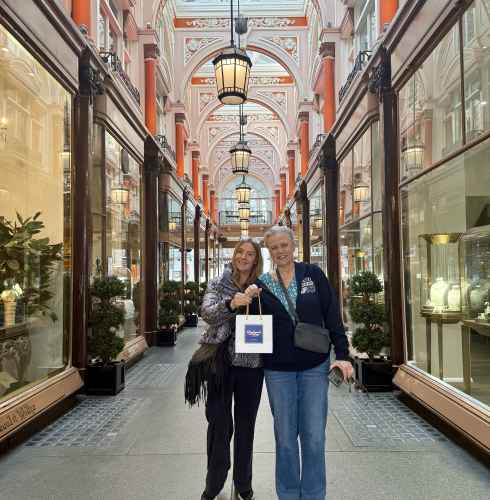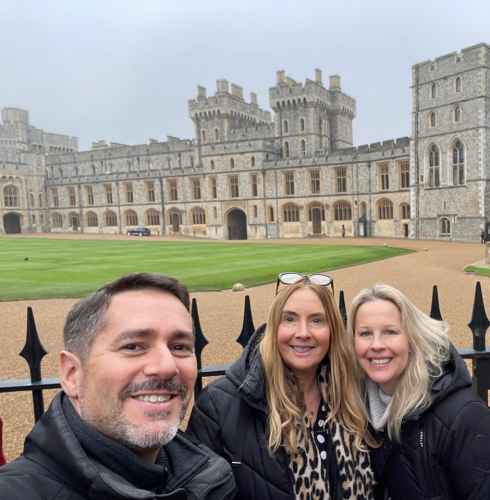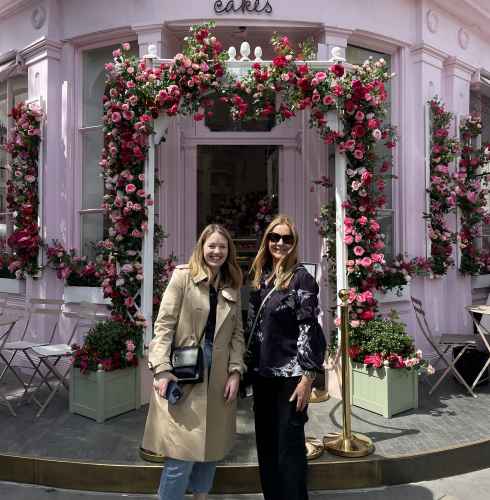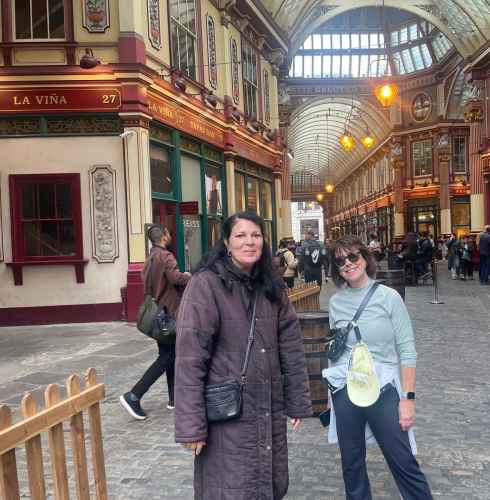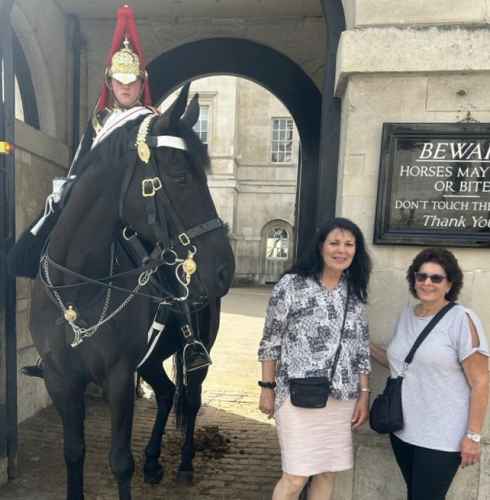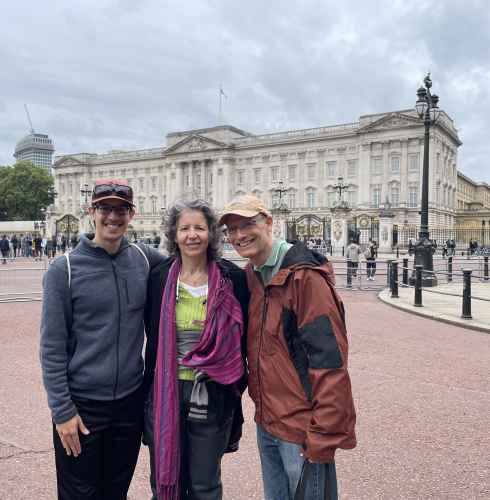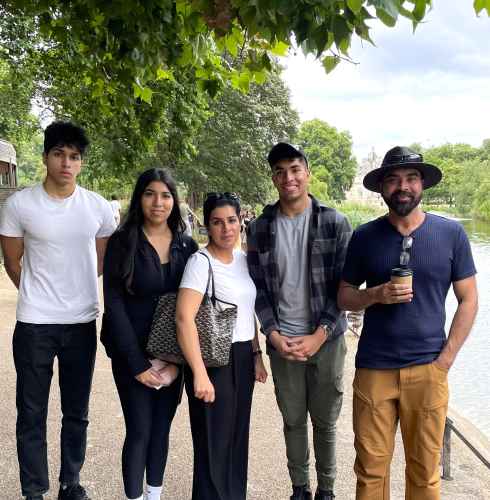We did a four-hour walking tour of the main areas of London. Our guide was perfect. We had hoped it would not be a cookie cutter tour that one could get anywhere, and it wasn’t. The facts and stories she shared about London were fascinating.Paula, London, 2025
Table Of Contents
- Signature Dishes Every Londoner Swears By
- London's Global Food Scene: Where My City Gets Interesting
- Street Food and Market Culture
- Sweet Treats and Bakery Culture
- Drinks and London's Social Culture
- Neighborhood Food Guides
- Local Food Traditions That Define London Life
- Avoiding Tourist Traps: Authentic vs. Performance
- Practical Tips for Eating Like a Local
- Frequently Asked Questions About London Food
- Final Thoughts: London's Best Food Story Continues
I measure a place by its queues, and in London they tell you exactly what’s worth eating.
After 34 years living here, born in Wembley with my mum’s cardamom chai competing with the smell of bacon from the next-door café, I’ve learned that the best food and London experiences happen where old meets new, where my nan’s recipes share space with my neighbor’s jollof rice.
When visitors ask me what to eat in London, I don't hand them a tourist guide. I take them where I actually eat, where my cousins argue about the best biryani, and where my mates queue for twenty minutes because the fish and chips are worth every second of waiting in the rain.
This city's food story lives in the steam from those late-night curry houses on Brick Lane, in the Sunday morning rush at Borough Market before the tourists wake up, in the way my Turkish neighbor makes better tea than most fancy hotels.
For anyone planning food in London, this is where to start.
Signature Dishes Every Londoner Swears By
My must-try favorite dishes start here. If you want the real deal when it comes to British foods, that's exactly what you'll get.
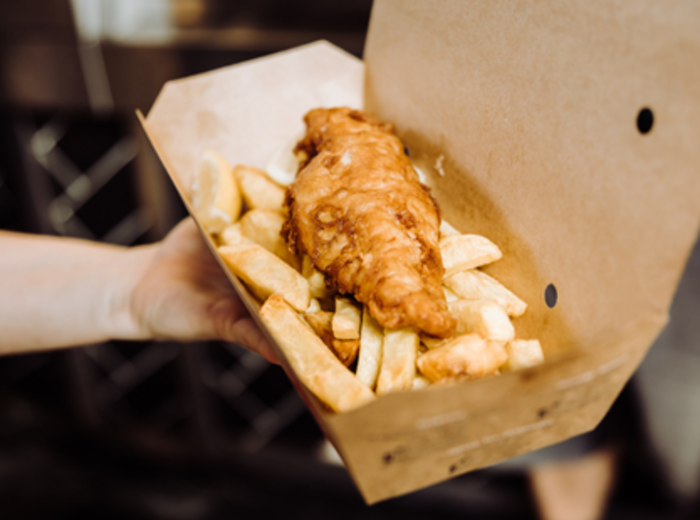
Golden fish and chips with mushy peas on newspaper
Fish and Chips: The Real Deal Worth Queuing For
Right, let’s start with fish and chips because I’m tired of watching tourists get served rubbish and thinking that’s what we’re famous for.
You know the places I mean: Union Jack bunting everywhere, photos of the Queen looking disapproving, and fish that tastes like it died of old age.
The secret? Watch the line of actual locals, preferably the ones covered in paint or plaster dust, because working people don’t waste time on mediocre food.
I drag every guest to Poppies Fish in Spitalfields because my mate Dave, who works the building sites around there, has been going for fifteen years.
When I bring people here, I watch their faces go from polite skepticism to actual understanding.
This isn’t just fried fish. This is the British food that kept dockers and builders going for generations. Oh, and call them chips, not French fries, and look for crispy batter on the best fish for a memorable meal.
London Is Not Just a Place on a List
Experience the real London through hidden corners and stories most visitors miss.
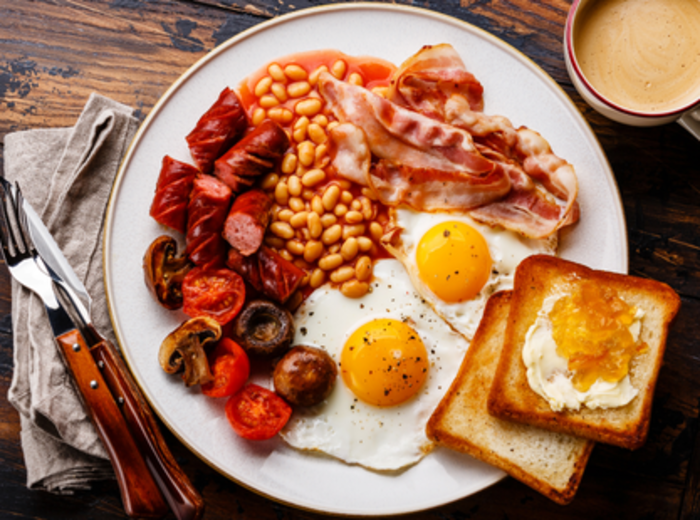
Full English breakfast
The Full English Breakfast: More Than Food, It's Ceremony
An English breakfast isn’t just what you eat. It’s how London starts its weekend mornings. It includes bacon, a fried egg or two, sausages, baked beans, grilled tomatoes, toast, and, if you’re doing it right, black pudding. Don’t let anyone convince you to skip the pudding because they think it sounds scary. It's one of those things to do in London that you may shy away from at first, but believe me, you won't regret at least trying. This pudding is rich and savory and pairs beautifully with that golden yolk.
Weekdays are rushed affairs where we grab coffee and pastries on the way to work.
Weekends are for the ritual. The best spots have been perfecting their timing for decades. Everything arrives hot, together, like a symphony of Saturday morning comfort.
My favorite places smell like proper bacon fat and fresh coffee, where the staff know how you like your eggs without asking twice.
That’s where real breakfast happens, not in places with menus in five languages.
My personal experience: if a breakfast menu lists a fried egg, baked beans, and black pudding, you are in the right place.
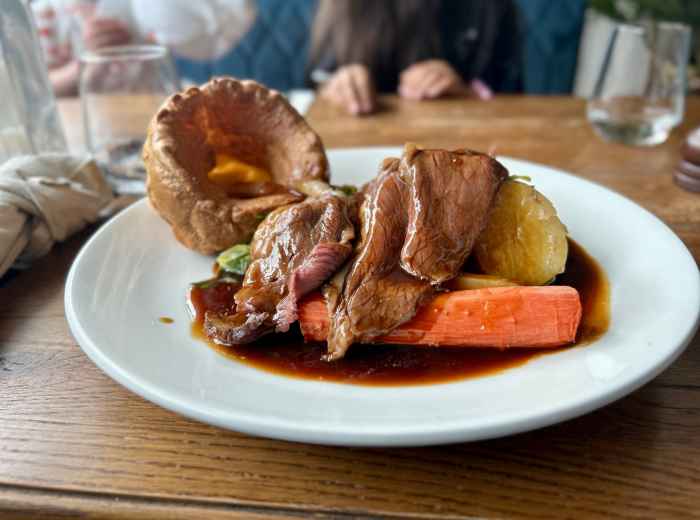
Delicious Sunday roast with Yorkshire pudding at The Windmill in Clapham Common
Sunday Roast: London’s Weekly Religion
Let me tell you about Sunday roast because it’s not just a meal. It’s basically our religion.
My family’s been doing this for generations, with beef, lamb, or chicken and Yorkshire pudding that’s crispy outside and fluffy inside like a savory cloud, roasted potatoes that crunch when you bite them, seasonal vegetables, and gravy that makes everything make sense.
The best places start serving at noon and can sell out by late afternoon. When it’s gone, it’s gone.
You want meat that falls apart when you look at it wrong, potatoes golden like autumn leaves, and gravy soaking into the Yorkshire pudding like it was always meant to be there.
I take different guests to different places depending on their vibe: the Pig and Butcher in Islington for traditional chops-and-roasts skill, Blacklock for the full theatrical experience with massive joints and all the trimmings, the Selkirk in Tooting for that neighborhood pub feel with a brilliant garden when the weather’s decent, and Trinity Arms in Brixton for a fantastic roast with a fire pit garden that makes winter Sundays feel special.
The fundamentals never change: quality ingredients, proper timing, and that feeling of a meal that brings people together for hours whether they planned to or not.
Think of it as Sunday lunch done right, with beef sirloin or chicken and potatoes cooked perfectly, plus sides like crispy onions.
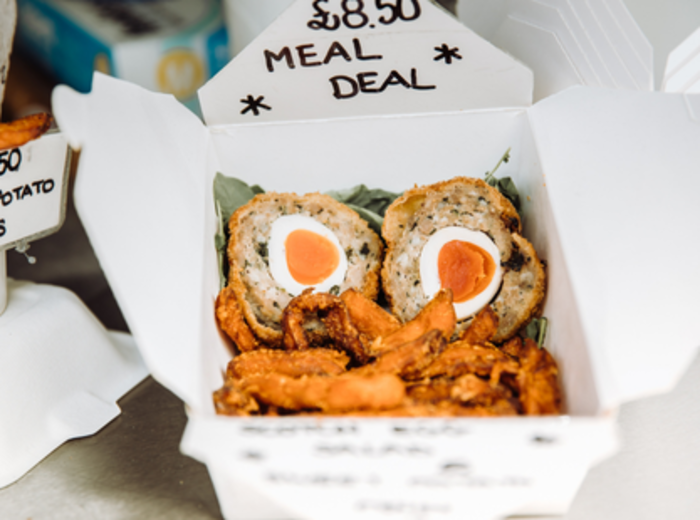
Scotch Egg
Scotch Egg: From Pub Snack to Something Special
The Scotch egg has had quite a journey from simple pub food to something artisan bakeries put their names on.
It’s a soft-boiled egg wrapped in seasoned sausage meat, coated in breadcrumbs, and fried until golden. The best ones have those jammy yolks that spill everywhere when you cut them.
When sticky toffee pudding is done well, it’s warm, sweet comfort that makes you understand why some British foods stay classics.

Sticky toffee pudding from the Devonshire Pub
Sticky Toffee Pudding: Sweet Comfort That Makes Sense
Sticky toffee pudding represents everything brilliant about British desserts.
Dense sponge cake drowning in toffee sauce, usually served with custard or vanilla ice cream. When it’s done well, it’s warm, sweet comfort that makes you understand why some British foods stay classics. Some places add whipped cream for a small extra cost.
Curious What Restaurants You Won’t Find Online?
Discover the side only locals talk about.
London's Global Food Scene: Where My City Gets Interesting
British cuisine is more than Beef Wellington or what some people may think are gross eggs. We have embraced food from all over the world and made it our own. I'll share some of my favorites here with you, enjoy responsibly!
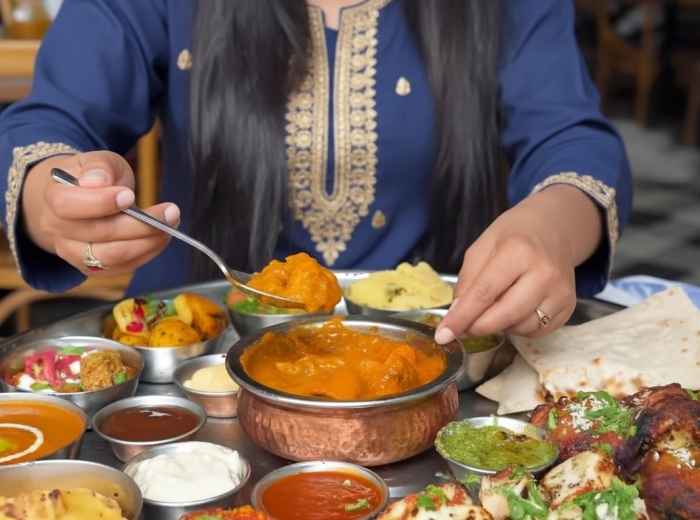
Tray with a variety of Indian dishes
Indian Food: From Heritage to Hidden Gems
Right, let’s talk about Indian food properly, because this is where my heart lives. My nan came here in the ’60s with cardamom pods sewn into her sari lining and recipes memorized in her head.
Chicken tikka masala might have been invented here, and my mum still argues with my aunties about whether it’s “real” Indian food. Honestly, it’s London food now.
The real treasures live where families like mine built British food cultures over generations. Southall is where my cousins go for proper Punjabi food.
Places like Brilliant Restaurant where the aunties scold you for not visiting London often enough, and Madhu’s, where they’ve been cooking reliable curries since before I was born. Tooting is my weekend pilgrimage for South Indian dosas that stretch across the table, with chefs arguing about spice blends in Tamil.
Tayyabs in Whitechapel turns out brilliant Punjabi food with that lively energy. You queue for tables, and nobody minds because the lamb chops are worth every minute of waiting.
When I take guests through these areas, we explore spice shops where my mum still buys garam masala ingredients individually, sweet centers making fresh jalebi, and places where Eid and Diwali celebrations spill onto the street.
Experiences Created by Locals, Just for You
See the city through the eyes of the people who call it home.
See how it works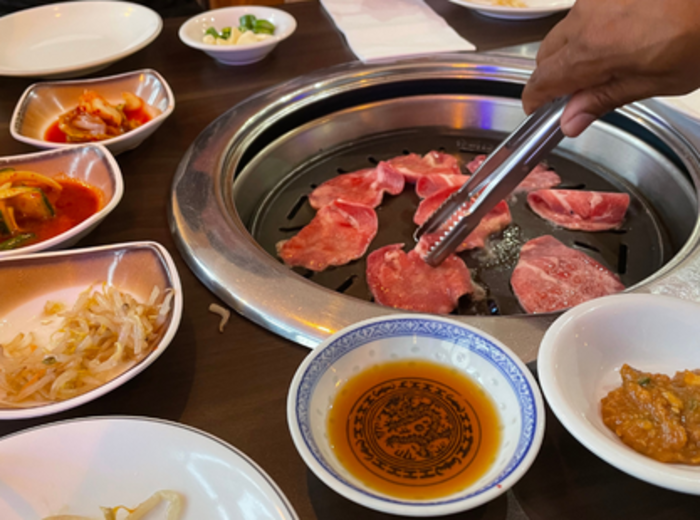
Korean fried chicken
Asian Excellence Beyond Chinatown
London’s Asian food world extends way beyond tourist-focused restaurants in Chinatown with laminated menus in five languages.
My mate Jin dragged me to Kingsland Road for proper Vietnamese pho, where the broth has been simmering since dawn and tastes like someone’s grandmother put her whole soul into it. You’ll also find Korean barbecue spots grilling galbi that rivals what you’d get in Seoul.
New Malden is home to London’s largest Korean community, which means fried chicken that stays crispy, kimchi that’s properly fermented and makes your eyes water in the best way, and bulgogi that doesn’t taste like it came from a jar.
Japanese bakeries scattered through the city serve shokupan, an incredibly soft, slightly sweet bread that makes the most perfect toast. Happy Sky Bakery in West London is where my Japanese colleague Yuki took me when I was having a proper rubbish week.
Their red bean buns and matcha treats are like edible therapy.
The Chinese restaurants doing weekend dim sum in suburban shopping centers are where three generations of families gather. That’s where you find regional cuisines that change with the seasons, not just what looks good on social media.
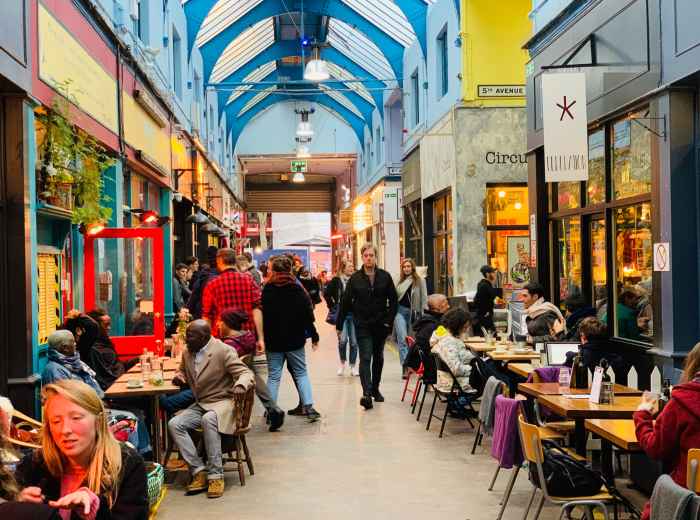
Brixton Village - packed with places to eat
Caribbean and West African Energy
Brixton Market pulses with Caribbean music and aromas that make you hungry before you see the food. Long-running stalls and restaurants keep the energy high, the spice levels serious, and the focus on good Caribbean food done right.
My West African friends drag me to places in Peckham that serve jollof rice so good it starts arguments about whether Nigerian or Ghanaian versions are superior.
Plantains come six different ways depending on how ripe they are and what the chef is feeling that day.

Turkish food from Gökyüzü
Middle Eastern and Turkish Community Cooking
Green Lanes is where my Turkish neighbors take their extended families for long Sunday meals. Gökyüzü serves huge mezze spreads that encourage three-hour conversations, fresh bread straight from wood-fired ovens, and grilled meats that smell like summer evenings.
The late-night döner culture feeds London’s nightlife, but during the day these places serve much more sophisticated food than post-pub kebabs.
Lebanese places like Meza serve mujadara that proves simple ingredients often beat fancy techniques.
Persian and Syrian restaurants are scattered across the city, offering rice dishes fragrant with saffron and sweets made with rosewater and pistachios.
These flavors connect London to places most of us have never been, yet they somehow taste like home.
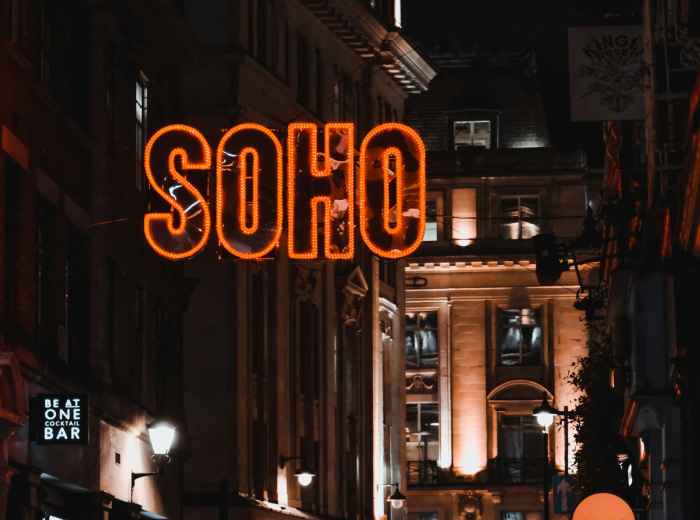
Soho street
Soho: Late-Night International Energy
Soho is where London does international food when we’re actually trying to impress ourselves. Tiny restaurants where you’re practically eating off your neighbor’s plate.
Somehow they pull off flavors that make you forget the cramped space. My coworkers and I crawl between wine bars serving natural wines with small plates that actually make sense together, not just look good on Instagram.
Walking down any Soho street after work is like speed-dating world cuisines.
Italian delis where staff argue in rapid Italian, Chinese bakeries with buns that disappear by noon, French wine bars where the bartender pretends not to understand your accent but pours excellent wine anyway, and modern British gastropubs doing clever seasonal things.
The whole neighborhood is mental food chaos, and somehow it works. You can have dim sum at lunch, French aperitifs at five, dinner somewhere with no English on the menu, then cocktails in a basement you’d never find again, all within stumbling distance.
For a truly fun experience, I recommend you plan London day trips that include these spots I'm talking about. That way, you get to see all sides of them and everything they have to offer.
Hungry to Try London's Authentic Food Yourself?
Taste and explore the flavors locals actually love.
Street Food and Market Culture
To me, British foods are many things, and food in London come in many shapes. Heading to local markets and checking out what they've got to munch on is a very London thing to do, and also something I'd recommend to visitors.

Borough Market
Borough Market: Navigating the Tourist Crowds
Look, Borough Market gets mixed reviews from locals because it’s expensive, crowded, and sometimes prioritizes Instagram moments over actual food quality. But if you know where to look and when to go, exceptional vendors still operate among the tourist traps.
The key is timing and know-how. I bring guests there early to avoid crowds and get better selection.
Focus on vendors locals actually use, the ones with shorter queues but better products. Think cheesemongers who know their suppliers, sourdough bakers who’ve been perfecting their starters for decades, and stalls selling seasonal goods that shift with the British weather.
For better value and more food that feels local, I often take people elsewhere. Go for fresh produce and street food vendors rather than photo ops.
Eager to Try These Foods for Real?
Our hosts can guide you to the best spots in Borough Market for an unforgettable experience.

A market with stall selling British pie and mashed potatoes\*
Alternative Markets Where Locals Actually Shop
Street food vendors at Maltby Street Market scratch the Borough vibe without the chaos. You’ll find everything from Vietnamese bánh mì to proper British pie and creamy mashed potatoes, without tourist prices or influencers photographing their lunch like it’s the Crown Jewels.
Food lovers who want to treat their taste buds to great food while enjoying traditional British staples will love these non-touristy spots.
Tooting Market is my weekend sanctuary for South Asian street food. Chaats with that perfect sweet, sour, and spicy hit. Fresh samosas with filling that’s actually seasoned. Rotis made while you watch, still warm when they hand them over. All at prices that won’t bankrupt you the way central London often does.
Mercato Metropolitano in Elephant and Castle feels like a community space where families bring kids for weekend meals, not a stage set pretending to be authentic.
Don’t Just Visit. Feel Part of It.
Locals share their city as they live it, so even a few hours can feel like you truly belong.
Different food cultures in London
Late-Night London Food Culture That Works
London’s late-night food culture reflects our multicultural reality and practical needs.
After the pubs close, kebab shops, fried chicken places, and Brick Lane’s Beigel Bake, which runs 24/7, keep night-shift workers and late travelers fed after the Tube stops.
These aren’t gourmet experiences, and they don’t pretend to be.
They’re functional food stops that serve a purpose. The best ones still take pride in their craft: fresh bread through the night, quality meats, sauces made in-house for a quick fix it is not half bad.
Taste the Real Food of London
A local can show you where to get the food Londoners really enjoy.
Sweet Treats and Bakery Culture
While we're known for fish and chips, many Londoners have a sweet tooth. If you've got one too, I've got a few recommendations that will promise a good time!

Table with tea cups, scones, and finger sandwiches
Afternoon Tea: Real vs. Performance
Traditional afternoon tea is British hospitality doing its best impression of itself. Visitors sometimes call it high tea, which is a different thing.
Finger sandwiches with the crusts cut off, scones with cream and jam, delicate pastries, tea served in proper pots with timing that would make my nan proud.
This is afternoon tea.
Top hotels now charge serious money for afternoon tea, while neighborhood rooms offer the same warmth for less.
The fundamentals never change: scones warm enough to melt butter, clotted cream thick enough to spread, jam that complements rather than dominates, and tea strong enough to cut through all that richness.
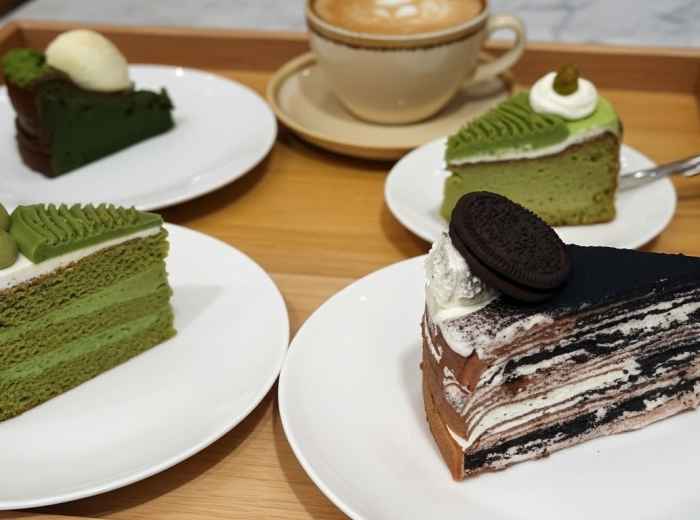
Matcha cheesecake and oreo cake from Kova Patisserie
Japanese Bakeries in London: A Different Approach to Sweets
London’s Japanese bakeries changed how I think about sweet things. Matcha cheesecakes balance bitter green tea with creamy richness. There’s melon pan with its crispy cookie crust over impossibly soft bread. Shokupan is so delicate it practically dissolves on your tongue.
Happy Sky Bakery in West London is where my Japanese colleague Yuki took me when I was having a rubbish week. Their red bean buns and matcha treats are like edible therapy sessions.
These bakeries tuck into residential neighborhoods, serving local Japanese communities and curious Londoners who stumble into a different approach to baking.
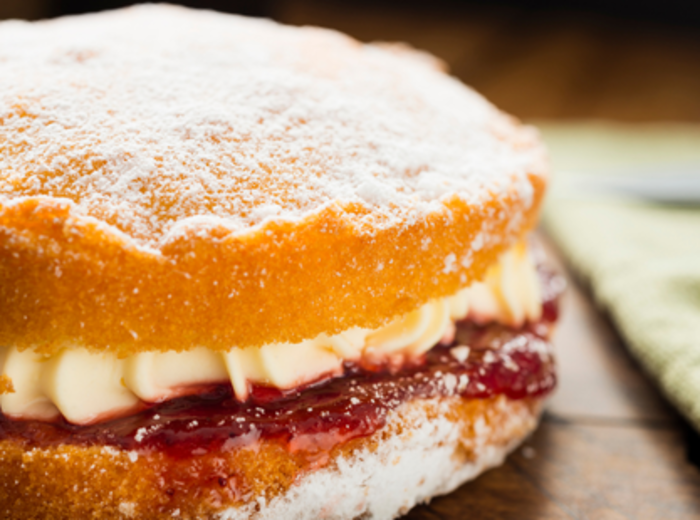
Victoria sponge cake with jam and cream
Traditional British Desserts
Traditional British sweets refuse to be pushed aside by fancy imports. Victoria sponge cake with jam and cream doesn’t pretend to be anything other than comfort food. Proper donuts with real jam centers. Market brownies that prioritize chocolate intensity over pretty pictures.
Drinks and London's Social Culture
Yes, Brits are known for loving a pint or two maybe a little too much. But it's part of our culture, and if you want to enjoy what makes London so awesome, there are a few places I want you to stop by.
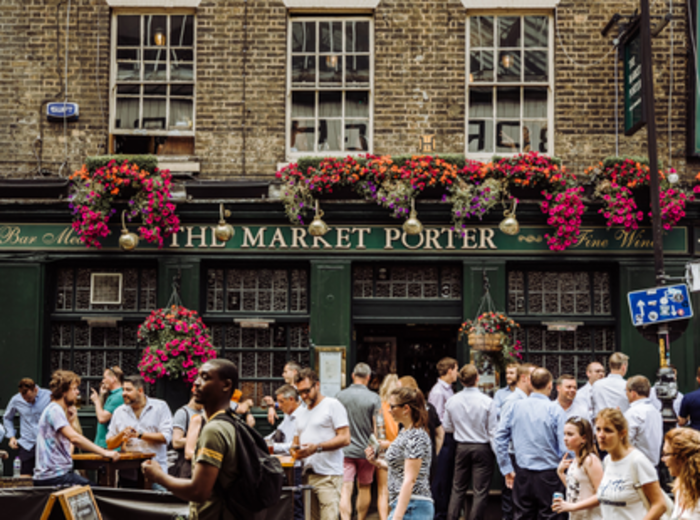
London street with pub
Pub Culture: Community Centers That Serve Truly British Food
London pubs are where real community happens, not just where we go to get pissed on weekends.
The food culture extends far beyond the drinks, though it starts with proper pint glasses and cask ales that change with the seasons because someone actually cares about what they’re serving.
The best pubs keep their soul and still serve food you’d want to eat sober. They pour local ales alongside the usual suspects, keep the wonky floors and mismatched furniture, and update their kitchens so the Sunday roast doesn’t taste like cardboard.
The Princess Louise in Holborn still has those gorgeous Victorian booths where you can hide from your problems, while The Harp in Covent Garden draws beer geeks and tourists who’ve stumbled onto something special. Both understand that good pubs feed your soul and your stomach.
Thirsty for the Real Deal in London?
Let a local show you where the best drinks are waiting to be savored.
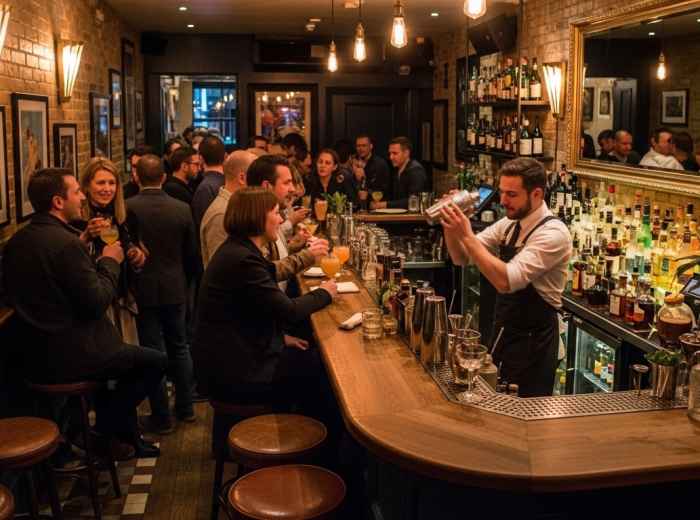
People enjoying cocktails
Soho Cocktail Culture
Soho’s cocktail bars range from historic boozers that have been pouring the same martinis since the ’80s to modern speakeasies hidden behind doors you’d walk past twice. The best ones focus on knowing how to make drinks rather than creating something that looks good on your story.
London’s craft gin movement has produced distilleries across the city, each creating botanical blends that capture local character. You can genuinely taste London in a properly made gin and tonic. It’s earthy and complex.
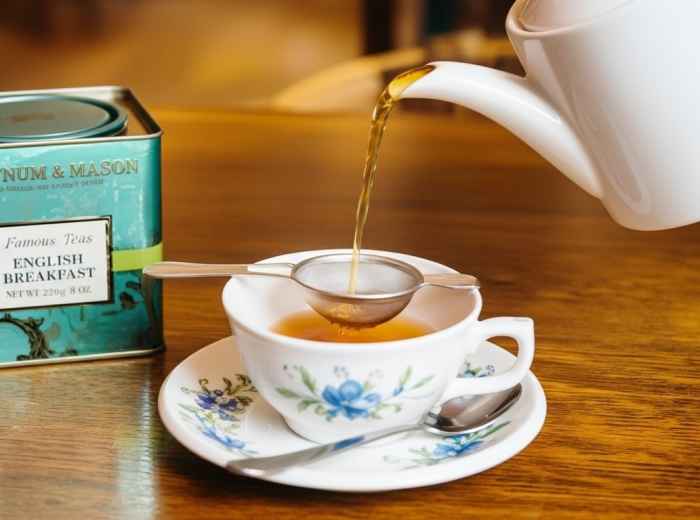
English Breakfast Tea from Fortnum & Mason
Tea Culture: From Basic to Boutique
Yes, I’m talking about tea twice.
Tea culture in London runs from basic “builder’s tea” to boutique tea shops serving varieties that cost more per cup than my lunch. The ritual matters as much as the leaves: proper teapots that warm gradually, milk added after the tea, sugar offered but judged if you need more than two.

Flat white coffee from Monmouth Coffee
Coffee: London's New Wave
London’s coffee scene evolved from instant granules and a prayer to independent roasters who treat baked beans like wine collectors treat vintage bottles.
You’ll find specialty brewing and cafes where baristas know more about extraction ratios than I know about my own family.
Monmouth Coffee is where the obsession started for many of us. The line out the door says enough. The best places balance technical precision with making you want to linger.
Find Out What Locals Eat and Why
Let us show you the true delicacies of London and taste for yourself why they're so popular.
Neighborhood Food Guides
Let's discuss in more detail why I recommend the neighborhoods where I eat. Forget about places that are 'Instagram-worthy.' This is where taste and flavor is more important that aesthetics.
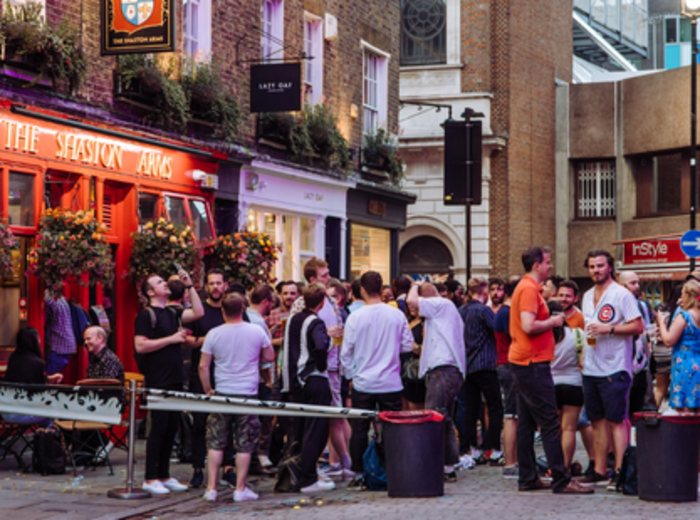
Vibrant Brick Lane
Brick Lane: More Than Just Curry Houses
Brick Lane is where my story starts, even though the touts make me cringe. Yes, there are curry houses, but the real food culture lives beyond the spots that target people who think naan comes with every meal.
Near Spitalfields you’ll find places where menus aren’t translated and the aunties remember your mum’s order from fifteen years ago.
The 24-hour bagel shops have fed night-shift workers since before anyone called anything “artisan,” and the coffee shops fuel the creative types who think they discovered the East End.
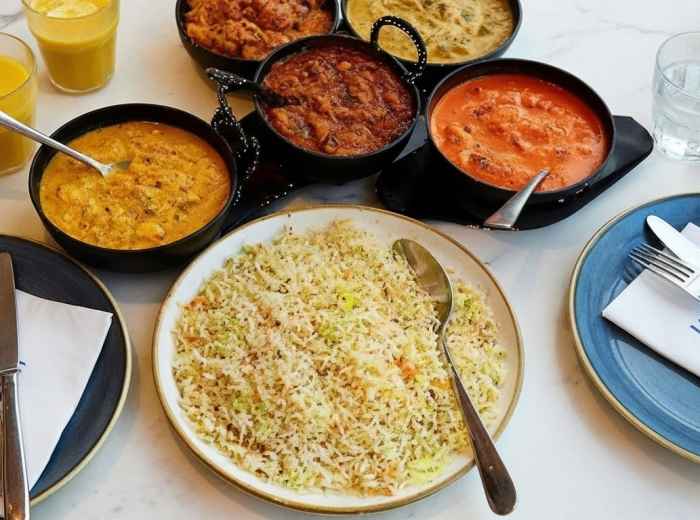
Curries from Pakistani Restaurant Lahore Karahi in Tooting
Tooting: South Asian Food Paradise
Tooting is my spiritual home for South Asian food. This is where I bring people who think they know curry but have only been to Brick Lane tourist spots. My family’s been going to Lahore Karahi since I was fifteen.
The food halls turn out South Indian dosas, Pakistani karahi, and Sri Lankan hoppers that make weekend journeys worth it.

Caribbean food spread
Brixton: Community Energy
Brixton Market hums with music and aromas that bring you back again and again. The covered market areas protect community cooking from developers who would turn everything into coffee bars. Multiple generations run stalls, serving recipes that never needed fixing.
Keen to Taste London’s Flavors?
Locals know just where the best meals are hiding - let them take you there.
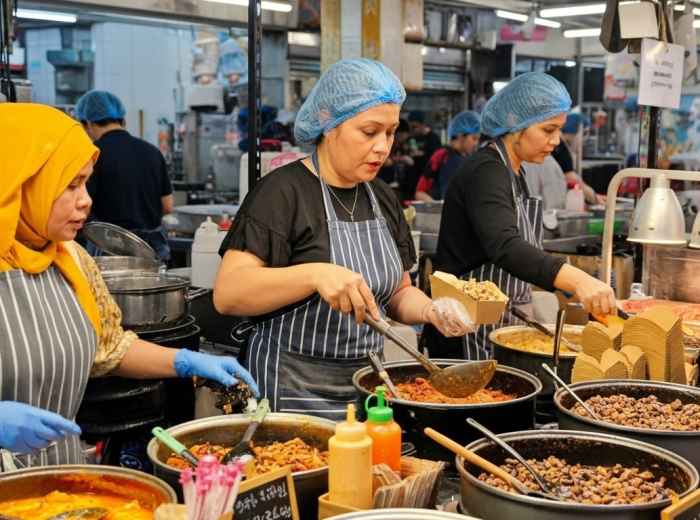
Upmarket Brick Lane Food Hall
East End Heritage and Innovation
The East End keeps London’s working-class food traditions alive alongside communities that now call these streets home.
You’ll find pie and mash shop stalwarts, jellied eel stalls (an acquired taste, I know!) that tourists photograph but locals eat at, and newer vendors serving families who’ve moved here in recent decades. Shoreditch markets blend heritage British cuisine with global flavors.
That’s how a food scene grows, keeping roots while adding branches. Look for a classic mash shop sign if you want that old school comfort.
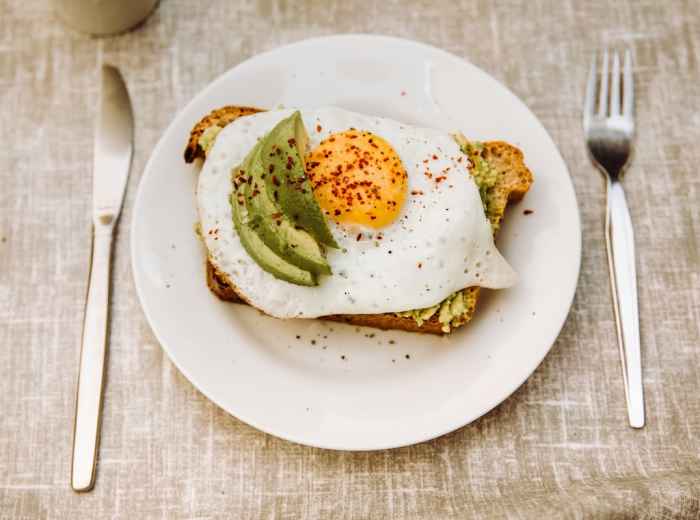
Egg and Avocado toast
Notting Hill: Weekend Café Culture
Notting Hill weekends center around cafes where people spend unrushed hours over brunch, talking about nothing urgent. Portobello Market attracts tourists, but the real character comes from spots serving locals who live here year-round.
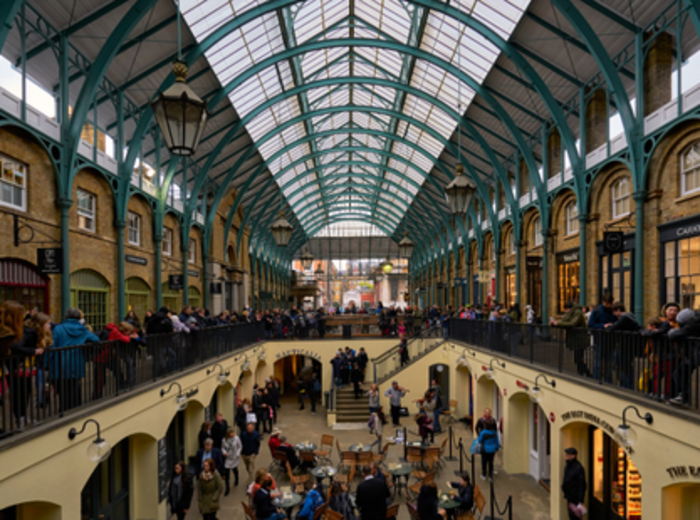
Covent Garden
Covent Garden: Theater District Dining
Covent Garden restaurants adapt to theater schedules. You get early dinners before the curtain and late suppers for post-show debates about whether that revival was worth the ticket.
The best places balance visitors with locals who work in the area. Some upscale spots offer celebration meals and must-try dishes like Beef Wellington when you want a memorable night.
People ask me for the best restaurants all the time, but these London neighborhoods are where I actually eat.
Local Food Traditions That Define London Life
Many establishments promise to give tourists the 'real deal,' but not all of them live up to their words. Here are a few traditions that will help you find the best places to eat.
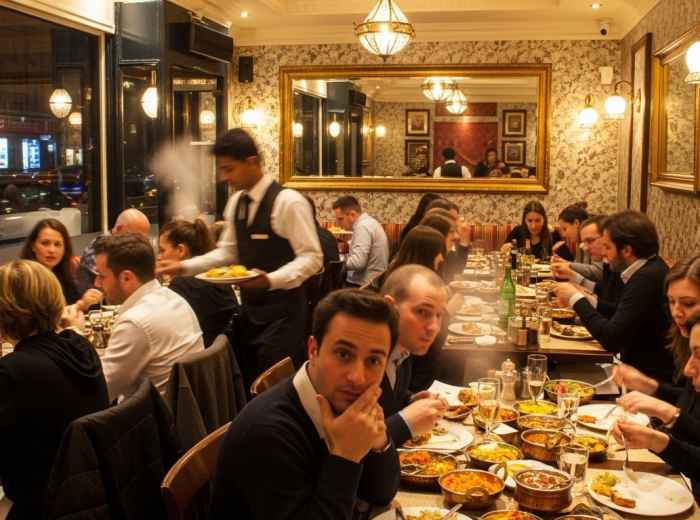
Busy Indian restaurant in Brick Lane
Friday Night Curry Ritual
Friday night curry is basically London’s weekly therapy session. After-work pints lead to group dinners where we argue about spice levels and order far too much food because everything looks brilliant when you’re three beers in and someone else is splitting the bill.
Different crowds have their spots. City types stumble to Brick Lane, and families in Southall gather at Punjabi places.
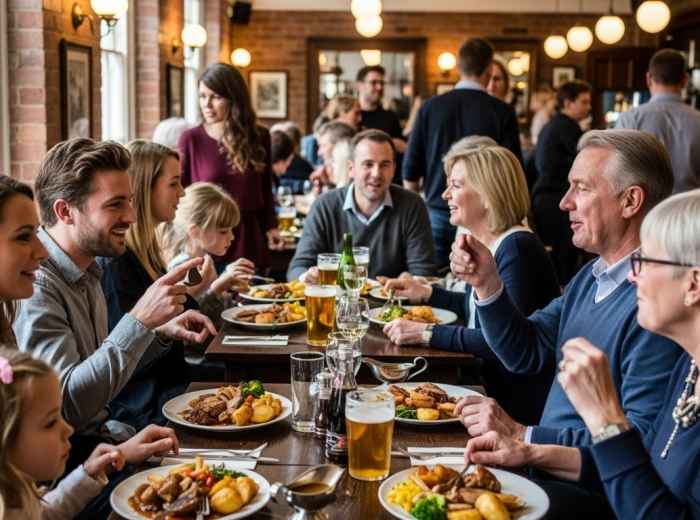
People sitting down for a Pub Sunday Roast
Sunday Roast as Social Ritual
As I've mentioned earlier, Sunday roast is when London becomes properly social. It’s extended family meals where kids run wild between tables, friend groups camp out for hours, and celebrations stretch through the afternoon.
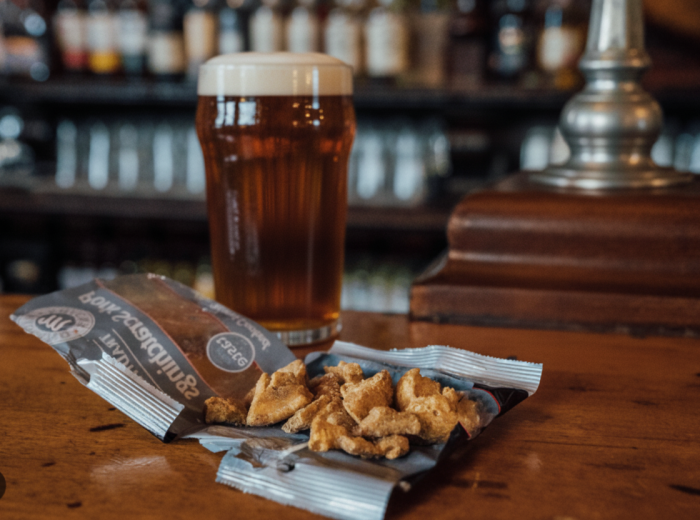
pork scratchings and pint of beer
Pub Snacks: Fuel for Casual Socializing
Pub snacks aren’t really about hunger. They’re about giving strangers something to talk about. Crisps, pork scratchings that could crack teeth, and cheese toasties that smell like childhood.
The portions encourage sharing, the salt makes you thirsty, and somehow you end up chatting with the bloke at the next table about whether Arsenal are actually cursed.
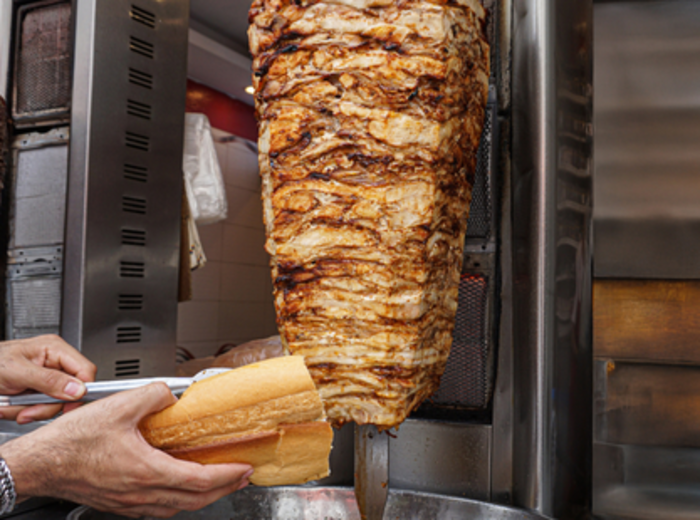
Döner meat
Late-Night Kebab Culture
Post-pub kebab runs are London’s most practical food culture. It’s döner meat carved fresh while you watch, stuffed into warm pita with enough salad and sauce to let you pretend it counts as balanced nutrition after six pints.
Try London's Diverse Cuisine For Yourself
London's food has more depth than any guidebook will show; let a local show you the truth.
Avoiding Tourist Traps: Authentic vs. Performance
Whether you want Beef Wellington or chicken tikka masala, these are places I recommend you avoid and rather look for London's hidden gems as I've discussed them previously.
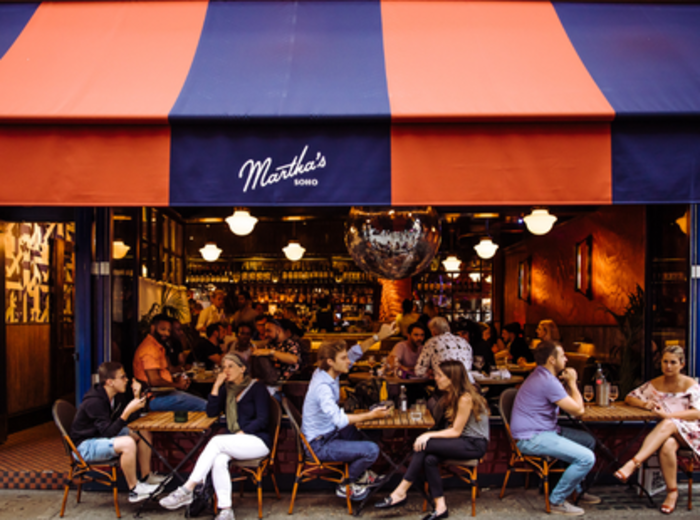
People enjoying a pub's atmosphere
Community Pubs vs. Tourist Productions
Tourist pubs near attractions are dinner theater with worse acting and overpriced fish and chips. Fake Victorian nonsense and staff who would rather be anywhere else serving microwaved shepherd’s pie to people in “I Love London” T-shirts.
Proper pubs smell like decades of good conversations. Regulars argue about football, the landlord knows your family history, and the food doesn’t pretend to be fine dining.
Booking Strategies That Work
Sunday roast bookings vanish faster than sunshine in November. Call a week ahead or you’ll be eating sad sandwiches at home.
Soho restaurants love their walk-in drama, but you’ll be queuing behind tourists who think they’ve discovered hidden gems every Londoner already knows.
Most places add a 10 to 12 percent service charge, so don’t feel guilty about not adding more. Check your bill first. Some cheeky spots near Leicester Square add a service charge, then suggest extra tips.
Travel tips for eating well in busy areas are simple: arrive early and book ahead.

People queueing outside restaurant
Understanding Queue Psychology
Long queues usually mean something’s worth eating, especially at food stalls where locals don’t bother with tourist nonsense.
We queue patiently for good food, and we can smell manufactured lines from three streets away.
Food trucks with locals and office workers mixed together offer real experiences, not just photo ops where the food tastes like cardboard.
Budget-Friendly Strategies
London eating will bankrupt you if you’re not careful, but community-run restaurants in residential areas serve proper food at prices that won’t scare you. Look for places where actual communities eat, not central spots targeting expense-account lunches.
Pub lunches give you proper portions at sensible prices, especially away from tourist traps charging for the postcode. Market stalls offer quality street food without the markup.
Before You Go, Talk to Someone Who Knows
A local video call helps you plan the trip that’s right for you.
Frequently Asked Questions About London Food
1. What food is London famous for?
Food in London is famous for fish and chips, roast, Full English breakfast, and afternoon tea. But London’s food scene reflects its multicultural population. Curry houses, dim sum, Turkish grills, and Caribbean specialties are just as representative.
2. Where should I get the best Sunday roast in London?
The best experiences happen in neighborhood gastropubs. Book in advance, arrive hungry, and expect to spend 2 to 3 hours enjoying the full experience with proper Yorkshire pudding and gravy that soaks into everything.
3. Is Borough Market worth visiting or overrated?
Borough Market has standout vendors and tourist traps. Go early for better selection, then try the markets in the section above for alternatives at a reasonable price.
4. Which Japanese bakeries are best in London?
Look for bakeries in residential areas serving shokupan, matcha desserts, and melon pan to locals first.
5. Where do locals eat in Soho?
Locals bounce between bars, small-plates spots, and late-night counters that balance international influences with quality ingredients.
6. What's the best Indian restaurant in Tooting?
Tooting has dozens of options. Explore the food halls and markets to find an Indian restaurant serving regional specialties at honest prices.
7. What are London's best food markets?
Beyond Borough Market, explore Maltby Street for weekend street food, Tooting Market for South Asian options, and Brixton Market for Caribbean specialties.
9. Where can I eat in London on a budget?
Focus on community spots in residential neighborhoods, pub lunches, and market stalls.
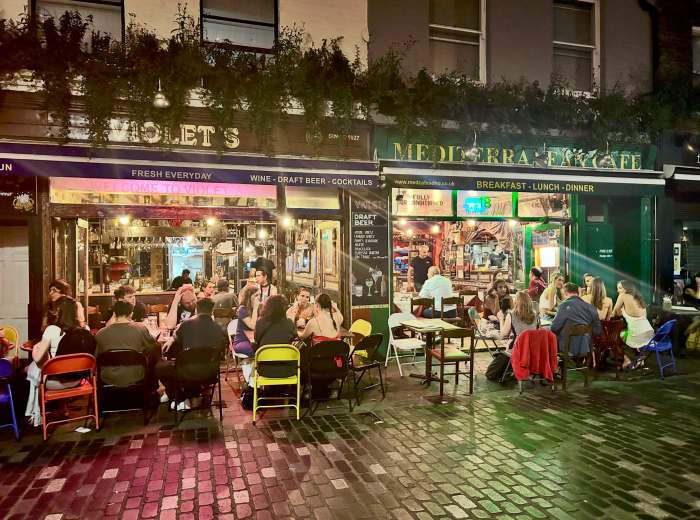
Soho restaurants at night
Final Thoughts: London's Best Food Story Continues
London’s food story is basically my family’s story. We’ve always been international, even when the government pretended we weren’t.
When I walk through Brick Lane at dawn, past curry houses closing as the bagel shops fire up their ovens, I see a city that never stops feeding itself.
I sometimes see families from six different countries arguing over vegetables at the same market stall, planning Sunday meals that will smell completely different but serve the same purpose of getting everyone around the table. That's when I understand why London restaurants drive writers mad trying to categorize them.
If you’re looking for a truly authentic UK experience with a food focus, the best way to understand it is simple: eat here with curiosity and a decent appetite.
Follow locals who know what they’re about, trust recommendations from people who actually live here, and remember that the meals you’ll tell stories about happen in places you’d walk past twice without someone like me dragging you inside.
When I take guests on food tours and walks and watch them realize this isn’t about restaurants or fancy cuisines, but about how food connects strangers into communities, that’s when they finally get what London’s food scene is about.
More London Adventures
Ready to Plan Your Perfect Day in London?
Start your experienceToo Many Lists, Not Enough Clarity?
We make exploring simple by connecting you with someone who knows the city and helps you spend your time on what matters to you.
Start planningWish You Had a Local Friend in London?
One who knows the city inside out and could plan a private day just for you? Our local hosts do exactly that: no scripts, no tourist traps, just the side of the city most people miss.
Meet Your London Hosts
A personalized way to explore London’s must-see landmarks beyond the tourist crowds.





